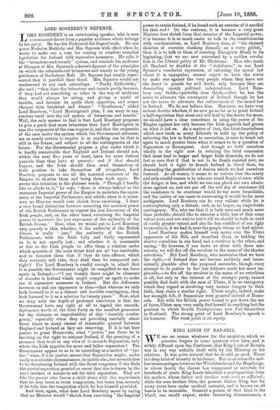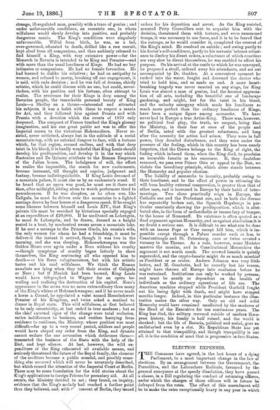KING LOUIS OF BAVARIA.
WE see no reason whatever for the suspicion, which we perceive lingers in some quarters even here, and is widely diffused upon the Continent, that King Louis of Bavaria was in any way unfairly dealt with by his Ministry or his relatives. It was quite natural that he should go mad. There is a deep taint of insanity in his house. Not to mention the end- less intermarriages between the Wit telsbachs and the Hapsburgs, in whose family the disease has reappeared at intervals for hundreds of years, King Louis inherited a predisposition from his mother, whose father and brother were both so afflicted ; while his own brother Otto, the present titular Sing, has for many years been under medical restraint, and is known on all hands to be incurable. Granted a poison of that kind in the blood, one would expect, under favouring circumstances, a strange, ill-regulated man, possibly with a trace of genius ; and under unfavourable conditions, an eccentric one, in whom wilfulness would slowly develop into positive, and probably dangerous mania. The King's conditions were singularly unfavourable. Wilful from birth, he was, as a lad, ever-governed, educated to death, drilled like a raw recruit, kept aloof from all companions, and then suddenly released to find himself a King, with very extensive power—for the Monarch in Bavaria is intended to be King and Premier—and with more than the usual loneliness of Kings. He had no boy intimates or companions. He had no female favourites. He had learned to dislike his relatives ; he had an antipathy to women, and refused to marry, breaking off one engagement, it is said, with rude decision ; and he was full of dreams, chiefly artistic, which he could discuss with no one, but could, never- theless, with his position and his fortune, often attempt to realise. The reverence for their Kings is deep among the Bavarian people, the remarkable personal beauty of King Loris—a Shelley on a throne—interested and attracted his subjects, it was a habit with them to respect a mania for Art, and they followed him against Prussia and with Prussia with a devotion which the events of 1870 only deepened. The conquest of France touched the King's gloomy imagination, and his one great public act was to offer the Imperial crown to the victorious Hohenzollern. Never re- sisted, never criticised, always lost in the solitude of a social mountain-top, with no external dangers to face, with a fortune which, for that region, seemed endless, and with that deep taint in his blood, it is hardly wonderful that King Louis should develop his predisposition, and develop it in the way which Snetonius and De Quincey attribute to the Roman Emperors of the Julian house. The indulgence of will, the effort to realise the impossible, the search for new excitements, became incessant, till thought and caprice, judgment and fantasy, became indistinguishable. If King Louis dreamed of a mountain palace, it must rise as by an enchanter's wand. If he heard that an opera was good, he must see it there and then, after midnight, sitting alone to watch performers tired to powerlessness. If he was sleepless, as he often was, like Caligula, he must be driven over the mountains in a lighted carriage drawn by four horses at a dangerous speed. If he caught some likeness between himself and Louis XIV., that King's private life must be searched by historians specially engaged at an expenditure of £20,000. If he meditated on Lohengrin, he must be Lohengrin, and be drawn, dressed as a knight seated in a boat, by mechanical swans across a mountain lake. If he sent a message to the Princess Gisela his cousin's wife the only woman for whom he had a friendship, it must be delivered the instant it arrived, though it was two in the morning, and she was sleeping. Hohenschwangau was the Golden Hones over again under a Nero without his cruelty —though symptoms of cruelty began latterly to show themselves, the King sentencing all who opposed him to death—or his fierce voluptuousness, but with his artistic tastes and his mad wilfulness. We think the Roman annalists are lying when they tell their stories of Caligula or Nero ; • but .if Munich had been burned, King Louis would have telegraphed to Wagner for an opera be- wailing and realising the destruction of his capital. Nero's appearance in the arena was no more extraordinary than many of the King's whims at Hohenschwangan; and if he never made a horse a Consul, he appointed a valet named Hesselachwert Premier of his Kingdom, and twice asked a sentinel to dinner in Royal state. This wild wilfulness, at first believed to be only eccentricity, at last ended in true madness ; but as the chief external signs of the change were total seclusion, entire indifference to business, and restless hurrying from residence to residence, the Ministry, whose position was most difficult—for up to a very recent period, soldiers and people would hare obeyed any order from the King, and dynasts cannot endure the one accusation which dethrones them— transacted the business of the State with the help of the Diet, and kept silence. At last, however, the wild ex- penditure of the King exhausted all available means, and seriously threatened the future of the Royal family, the clamour of the creditors became a public scandal, and possibly some- thing else occurred which will never be accurately described, but which roused the attention of the Imperial Court at Berlin. There may be some foundation for the wild stories about the King's applications to foreign Princes for pecuniary aid. At all events, the Ministry decided to act ; they found, on inquiry, evidence that the King's malady had reached a further point than they believed, and, with t' consent of Berlin, they issued
orders for his deposition and arrest. As the King resisted, arrested Privy Councillors sent to acquaint him with the decision, threatened them with torture, and even summoned troops, it was necessary to use force, and it is to be feared that the outrage, as he would consider it, completed the overset of the King's mind. He resolved on suicide ; and owing partly to his doctor's self-confidence, partly to his servants' intense reluct- ance to disobey his direct orders, a reluctance of which courtiers are very slow to divest themselves, he was enabled to effect his purpose. On his arrival at the castle to which he was conveyed, he proposed a stroll, ordered away his attendants, and set oat accompanied by Dr. Gudden. At a convenient moment he rushed into the water, fought and drowned the doctor who tried to hold him, and so made an end. A more heart- breaking tragedy was never enacted on any stage, for King Louis was almost a man of genius, had the keenest apprecia- tion of all arts, including the beautiful one of landscape gardening, and might, but for the taint in his blood, and the unlucky misogyny which made his loneliness so much more perfect than the ordinary loneliness of Kings, have been a unique figure among monarchs. We have never had in Europe a tine Artist-King. There was, however, no political foul play, the truth, we suspect, being that the Ministry, in their fear at once of the people and of Berlin, acted with the greatest reluctance, and long after the necessity for action had arisen. They were in full power, they dreaded disturbance, and they were under the pressure of the feeling, which in this country has been nearly forgotten, that the Crown belongs to the King of right, the feeling which induced them, when the King died, to proclaim an incurable lunatic as his successor. If, they doubtless reasoned, we pass over Prince Otto or appeal to the Diet, we violate the hereditary principle, which alone stands between the Monarchy and popular election.
The liability of monarchs to insanity, probably owing to their loneliness, and to the effect of power in releasing the will from healthy external compression, is greater than that of other men, and is increased in Europe by their habit of inter- marriage. Two clans practically reign in Europe, the Catholic one and the Protestant one, and in both the disease has repeatedly broken out, the Spanish Hapsburgs in par- ticular constantly showing the predisposition, which is attri- buted also, in the form of melancholia or insane fury of temper, to the house of Romanoff. Its existence is often quoted as a final argument against Monarchy, and as against absolutism it is no doubt a serious one. It is difficult to see what can be done with an insane Pope or Czar except kill him, which is im- possible except through a Palace murder such as has, in Constantinople and St. Petersburg, cnce or twice created a vacancy in the Throne. As a rule, however, some Minister masters the maniac, and in Constitutional Monarchies the argument is not worth much. The avowed lunatic is quietly superseded, and the crypto-lunatic might do as much mischief as President or as orator. Andrew Johnson was very little better, and M. Gambetta, had he secretly lost his reason, might have thrown all Europe into confusion before he was restrained. Institutions can only be worked by persons, and must be nearly as dependent on the health of individuals as the ordinary operations of life are. The American machine stopped while President Garfield fought out his losing fight with death, and might have stopped months longer. Indeed, in this particular instance the illus- tration makes the other way. Only an old and solid Monarchy could have remained unaffected by the madness of the Head of the Executive for ten continuous years. The King has died, the solitary crowned suicide of modern Euro- pean history, his family is half ruined, and the world is shocked ; but the life of Bavaria, political and social, goes on undisturbed even by a riot. No Republican State has yet attained to that tranquillity, and though tranquillity is not all, it is the condition of most that is progressive in free States.





































 Previous page
Previous page